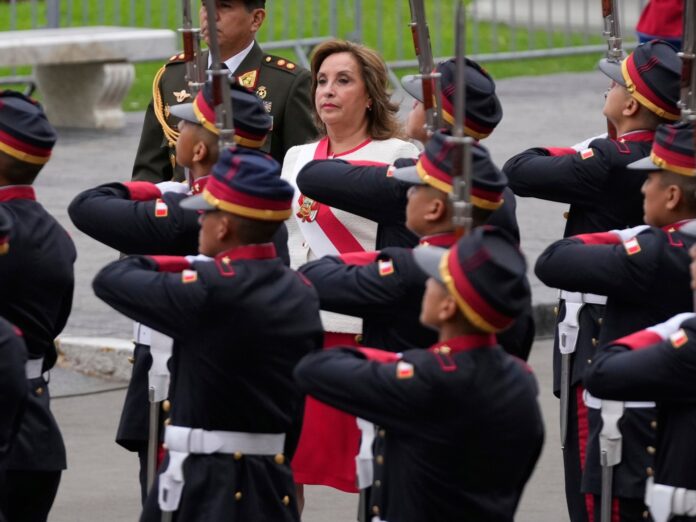President Dina Boluarte has blasted the Inter-American Court of Human Rights for its opposition to a recently passed bill that would grant amnesty to soldiers, police officers and other security personnel involved in Peru’s internal conflict from 1985 to 2000.
On Thursday, Boluarte asserted that the international court had overstepped its authority by seeking the law’s suspension.
“We are not anyone’s colony,” she said, posting a snippet of her speech to social media.
“And we will not allow the intervention of the Inter-American Court that intends to suspend a bill that seeks justice for members of our armed forces, our National Police and the self-defence committees that fought, risking their lives, against the insanity of terrorism.”
Since passing Peru’s Congress in July, the amnesty law has been awaiting Boluarte’s approval. She can either sign it into law, allow it to take effect automatically or send it back to Congress for revisions.
But the bill has prompted international outcry, not least because it is seen to shield security forces from accountability for the atrocities that unfolded during Peru’s war.
The legislation would also offer “humanitarian” amnesty to perpetrators over age 70 who have been convicted of wartime crimes.
Some 70,000 people were killed in the internal conflict, the majority of them from rural and Indigenous communities.
Soldiers and police officers were ostensibly tasked with combatting armed uprisings from rebel groups like the Shining Path and the Tupac Amaru Revolutionary Movement. But the conflict became infamous for its human rights abuses and massacres of civilians with no ties to any rebel group.
Francisco Ochoa was 14 years old when residents in his Andean village, Accomarca, were slaughtered by soldiers. He told Al Jazeera earlier this week that he and other survivors felt “outraged and betrayed” by the new amnesty law.
International organisations have likewise denounced the law as a step backwards for Peruvian society.
Nine human rights experts with the United Nations signed a statement on July 17 expressing “alarm” at the bill’s passage through Congress. They called on the government of Peru to veto the bill.
“The proposed legislation would prevent the criminal prosecution and condemnation of individuals who committed gross human rights violations during Peru’s internal armed conflict,” they said.
“It would put the State in clear breach of its obligations under international law.”
A week later, on July 24, the president of the Inter-American Court of Human Rights, Nancy Hernandez Lopez, ordered Peru to “immediately suspend the processing” of the bill. She ruled that the legislation violated previous rulings against such amnesty laws in the country.
“If it is not suspended, the competent authorities refrain from enforcing this law,” she said.
She noted that a session would be convened with survivors, Peruvian officials and members of the Inter-American Commission on Human Rights (IACHR).
In previous rulings, the Inter-American Court has found that amnesty laws and statutes of limitations are unlawful in the case of serious human rights violations like forced disappearances and extrajudicial executions.
It also declared that age is not a disqualifying factor for suspects accused of grave human rights abuses. Such exemptions, the court said, are only acceptable under international law for lesser or nonviolent offences.
The National Human Rights Coordinator, a coalition of humanitarian groups in Peru, estimates that the country’s latest amnesty law could overturn 156 convictions and disrupt more than 600 ongoing investigations.
A previous amnesty law implemented in 1995, under then-President Alberto Fujimori, was later repealed.
Still, President Boluarte on Thursday sought to frame her government’s actions as in line with international human rights standards.
“We are defenders of human rights, of citizens,” she wrote on social media, while emphasising that her government was “free”, “sovereign” and “autonomous”, apparent jabs at the Inter-American Court’s decision.


